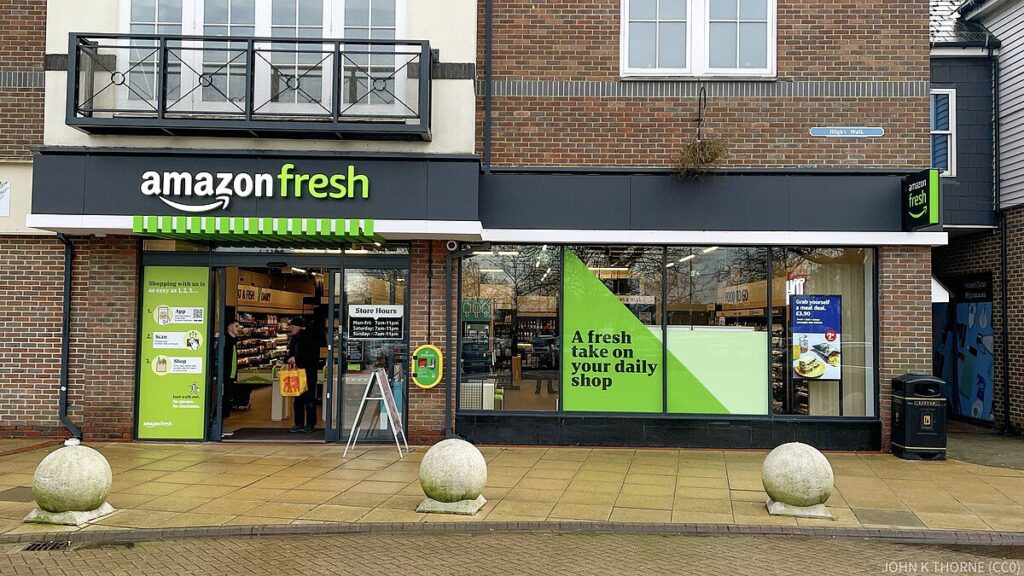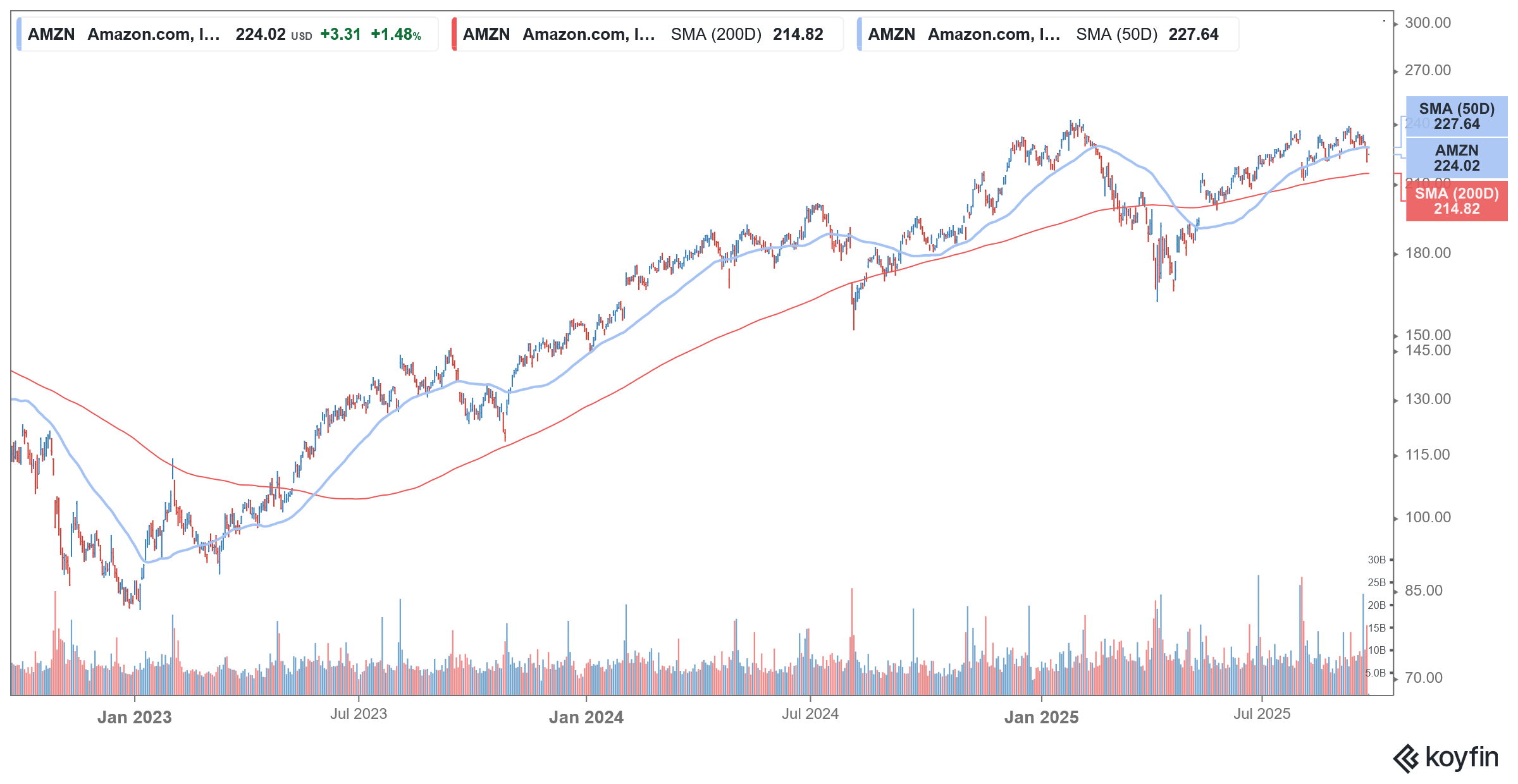
Amazon (NYSE: AMZN) is pulling the plug on its physical Amazon Fresh stores in the UK, a bold but short-lived experiment that saw the e-commerce giant attempt to disrupt the British grocery market with its high-tech, cashier-less shopping concept.
The company has announced its intention to close all 19 of its Amazon Fresh stores, with a handful of the locations set to be converted into its premium Whole Foods Market brand.
The decision marks a significant strategic pivot for Amazon, which first introduced the “Just Walk Out” technology to the UK in 2021 with the opening of its Ealing store. The concept, which allowed customers to simply grab items and leave without going through a traditional checkout, was hailed as a glimpse into the future of retail. However, it seems the reality did not live up to the hype.
“Since 2008, we’ve worked hard to innovate to help our customers save time and money when shopping for groceries and household essentials,” said John Boumphrey, Country Manager, Amazon UK.
He added, “We continue to invent and invest to bring more choice and convenience to UK customers, enabling them to shop for a wide range of everyday essentials and groceries with low prices and fast delivery through Amazon.co.uk, Amazon Fresh, and Whole Foods Market stores, alongside our third-party grocery partners, including Morrisons, Co-op, Iceland, and Gopuff.”
The move comes as no surprise to industry analysts who noted that the stores, located predominantly in London, struggled to gain significant traction against established grocery titans like Tesco, Sainsbury’s, and Aldi. While the novelty of the “Just Walk Out” system attracted initial interest, customer adoption was slower than anticipated. Critics and shoppers alike questioned the “soulless” experience of the technology and the lack of a clear market identity for the brand.
Amazon has stated that the closure is a “difficult decision” that follows a “thorough evaluation of business operations and the very substantial growth opportunities in online delivery.” The company’s focus is now shifting to what it sees as its core strength: online grocery.
The closures coincide with Amazon’s plans to ramp up its online grocery offerings in the UK. The company intends to “more than double” the number of Prime members who have access to at least three of its grocery options through partnerships with major retailers like Morrisons, Iceland, Co-op, and Gopuff. Furthermore, Amazon plans to introduce same-day delivery for fresh groceries, including dairy, meat, and seafood, on its main UK website next year.
In a move to consolidate its physical presence, Amazon will convert five of the closing Amazon Fresh stores into Whole Foods Market locations. This will expand Whole Foods’ footprint in the UK to 12 stores by the end of next year, signaling Amazon’s belief in the premium, organic grocery market as a viable brick-and-mortar venture.
The closures will affect around 250 jobs, although Amazon has stated its goal is to offer redeployment opportunities to as many affected employees as possible within other parts of its business. While the “Just Walk Out” era in the UK has come to a swift end, Amazon’s commitment to the British grocery market remains, albeit with a renewed and distinct focus on its digital dominance and its niche, upmarket brand.
Meanwhile, Amazon’s decision to shut Fresh stores in the UK seems part of a broader rejig of its grocery business. Last month, the company expanded its same-day delivery service to include fresh, perishable groceries. This expansion, which is being rolled out to more than 1,000 US cities and is planned to reach over 2,300 locations by the end of 2025, marks a major step in the company’s efforts to provide a comprehensive, one-stop shopping experience for its customers.
The new service allows Prime members to order thousands of fresh grocery items, including produce, dairy, meat, seafood, and frozen foods, alongside millions of other products like electronics, household essentials, and apparel, all in a single cart for same-day delivery. This integration is a key component of Amazon’s strategy, addressing past customer confusion where groceries and other items were separated into different online shopping carts.
For Prime members, the same-day grocery delivery service is free on orders over $25 in most cities. For orders below the minimum, a small fee of $2.99 applies. Non-Prime members can also utilize the service for a fee of $12.99, regardless of the order size.
By leveraging its vast logistics network and offering a consolidated shopping experience, Amazon aims to attract a wider customer base and deepen its relationship with existing Prime members.
Early results from test cities like Phoenix, Orlando, and Kansas City have been promising. Amazon reports that many of these were first-time grocery shoppers who, after using the same-day service, returned to shop twice as often. Interestingly, strawberries have even outperformed popular electronics like AirPods in the top five best-selling products in these regions, highlighting the strong consumer demand for this new service.

Meanwhile, while e-commerce still accounts for the bulk of Amazon’s revenues, it is making a big bet on AI with a sweeping strategy that is integrating generative AI across every facet of its vast business.
Amazon is using AI in its logistics business to improve efficiencies. The company is using AI to optimize its logistics network, with models like DeepFleet coordinating its vast network of robots to improve productivity and delivery speed.
Wells Fargo upgraded Amazon to an overweight today while raising the target price to $280. The central thesis of the Wells Fargo upgrade is “Project Rainier,” a dedicated AWS data center for Anthropic compute in Indiana. This new facility, expected to come online in early 2026, is a key component of Amazon’s strategy to meet the soaring demand for AI-related cloud infrastructure. Wells Fargo estimates that at full capacity, Project Rainier could contribute an impressive $14 billion in annual AWS revenue.
The Wells Fargo report also highlights a more optimistic view of the entire cloud market, fueled by massive AI-related compute contracts. The analysts now project the cloud industry will expand to $873 billion by 2029, a staggering increase from the $230 billion in 2024. While other players like Oracle and new entrants will gain share, the sheer size of the expanding market means more revenue for all participants, especially incumbents like AWS.
The post Amazon to shut all Fresh stores in the UK as it rejigs grocery strategy appeared first on BuyShares.co.uk.
Also read: Why is Sign Price Rallying? EthSign Token Breakout 30% Reason Out